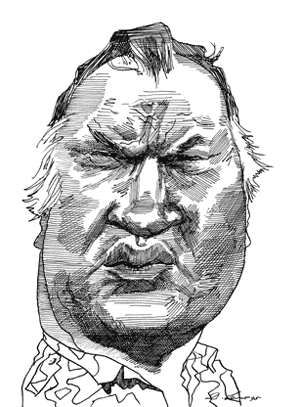In response to:
The Madness of General Mladic from the October 5, 1995 issue
To the Editors:
Imagine my surprise on picking up the October 5 edition of your excellent publication to find a cover piece on “The Madness of General Mladic” by Robert Block in which numerous passages were virtually identical to those in a profile of the Bosnian Serb commander under my byline in The New York Times Magazine a year and one month earlier!
The parallel passages concern the birth of Mladic, the origin of his given name, the World War II activities of his Partizan parents, his schooling, his military career, his choice of “Yugoslav” nationality which he retained until the civil wars of the 1990s, how he was selected in May 1992 as the Bosnian Serb commander and the 1994 suicide of his daughter.
I would not trouble you over this “sincerest form of flattery,” except that Mr. Block did the same thing in his shorter profile of Mladic in The Independent earlier this year, scooping large passages from my article. At least this time Mr. Block alluded to my piece in a footnote.
Allow me to say also that, having spent much more time around Mladic and his colleagues than Mr. Block, I strongly wish to disassociate myself from his assessment of the general as a crazed killer. Until compelling evidence to the contrary surfaces, I will continue to view Mladic as a superb professional, an opinion voiced by senior American, British, French and Canadian military officers who have met him or followed his career and who are better qualified to judge him than either Block or I.
David Binder
The New York Times
Washington Bureau
Washington, D.C.
Robert Block replies:
David Binder may be a journalist with a long and distinguished reporting career in the Balkans, but he is not the proprietor of conventional wisdom. The “parallel passages” that he accuses me of lifting from his own profile of General Mladic are facts known by every journalist who has spent any time in former Yugoslavia. They have been repeated in countless newspapers and magazines on both sides of the Atlantic. Mladic himself spoke to me of his Partizan father’s death and of his desire “to welcome” a German contribution to the UN peacekeeping forces this summer. (“I owe them a special debt.”) Likewise, his daughter’s suicide is no secret. It is Mladic himself who told me that when in Belgrade he always visits her graveside.
The details of Mladic’s birth, family, career, and the meaning of his first name, are all common knowledge. They are by no means, as Mr. Binder implies, the intellectual property of a single journalist. Therefore, it is not strange to find in Mr. Binder’s own profile numerous passages on the same topics which bear more than a striking resemblance to those in an article by Gaja Petkovic, the former Yugoslav officer who is a source for both our stories, which I cited in my article. When writing a profile of someone like Mladic such repetitions of fact are inevitable. Furthermore, of all people, Mr. Binder should know how Bosnian Serb officials speak in stock phrases. Thus Bosnian Serb “Vice President” Nikola Koljevic, whom I last interviewed in June, will proudly recount on demand the story of how he and his cohorts first became aware of Mladic.
As to the high esteem in which Mr. Binder holds the general, I can only offer the following: If we were to disregard the International War Crimes Tribunal’s indictment of Mladic for genocide, as well as all the plausible evidence of his direct involvement in ordering many of the crimes, the least one can say is that as the commander of an army, Mladic can be held responsible for the acts of those under him. While Mr. Binder may be able to see in General Mladic a “superb professional,” the conduct of Bosnian Serb soldiers in places such as Srebrenica says otherwise.
This Issue
December 21, 1995




